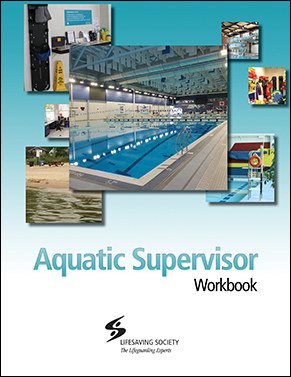Aquatic Supervisor certification is the Lifesaving Society training standard for instructors and lifeguards who wish to assume deck-level supervisor responsibilities for overseeing instructional and recreational programs and day-to-day operations at aquatic facilities.
Aquatic Supervisor introduces participants to the knowledge, skills and tools require to effectively guide fellow staff members in the safe delivery of aquatic programs and services, and to prepare for effective emergency response.
This checklist identifies the learning outcomes that you must achieve in order to be successful on the course.
Prerequisite: Lifesaving Society Swim Instructor or Lifesaving Instructor, and National Lifeguard certifications (need not be current).
Instruction & certification: Current Aquatic Management Instructors (who hold Aquatic Supervisor) teach and certify candidates.
Candidate recognition: Certification card.
Required references: Aquatic Supervisor Workbook, Guide to Ontario Public Pools Regulation (and 2025 update insert), Alert: Lifeguarding in Action. (Note that some affiliates provide materials to candidates, and some require candidates to purchase materials on their own. Double check before you purchase.)
Instructional format: Aquatic Supervisor may be delivered through online learning, blended learning, or in-person learning.
Instructional time (13 hr. classroom): Actual time needed may vary depending on course format, number of candidates and the learning activities selected. One-weekend formats are common for in-person courses. Breaks require additional time. Based on 12-16 candidates.
:::

Required equipment: For in-person delivery - classroom supplies such as tables, chairs, flip charts, markers, masking tape, A/V equipment. For online delivery - computer screen with camera and audio set up required. Consideration should be given to the use of multiple screens to support delivery of the program.
Recertification: Aquatic Supervisor need not be recertified.
Fees: The Lifesaving Society exam fee applies to successful and unsuccessful candidates alike.
AT-A-GLANCE
The Aquatic Supervisor course curriculum is organized as follows:
Unit 1 - Opening Session: Intro and The Lifesaving Society. Overview of the course content and structure; creates a positive learning environment; confirms the performance requirements for candidates; enhances the Aquatic Supervisor candidate’s understanding of and relationship with the Lifesaving Society.
Unit 2 - The Role of the Supervisor. Explores the roles supervisory personnel play in the aquatic workplace, the types of job responsibilities commonly assigned to them, and the attendant leadership and role modeling expected of them as aquatic professionals; explores and practices problem-solving and decision- making skills at a supervisory level.
Unit 3 - Rules of the Water. Develops a working understanding of aquatic operation standards imposed by regulations, guidelines, policies and procedures; explores government employment standards and employer guidelines affecting employees in the aquatic workplace; investigates the supervisor’s role in identifying and addressing compliance issues.
Unit 4 - Facility Management. Introduces the basic knowledge, skills and practices necessary to maintain safe swimming pool water; develops an awareness of common risks and hazards presented by aquatic facility design and amenities, and an understanding of how to manage them.
Unit 5 - Safety Supervision in Programs and Services. Develops the skills needed to monitor and manage the safe delivery of aquatic programs and services; develops an understanding of factors that influence and compromise safety in an aquatic setting and an appreciation for methods to enhance that safety.
Unit 6 - Managing Your Aquatic Team. Develops an understanding of the role deck- level supervisors play in the development of aquatic team members in both designated training sessions and day-to-day training opportunities; enhances supervisory skills and knowledge used in training and team development.
Unit 7 - Customer Engagement. Explores key characteristics of customer service; develops an appreciation of the importance that customer service plays in a successful aquatic operation.
Unit 8 - Emergency Response - as a Supervisor. Provides supervisor candidates with the tools and knowledge needed to guide a team in the effective prevention and management of incidents in aquatic operations.
Unit 9 - Closing Session: Evaluation and Opportunities. Provides candidates with their results and outlines volunteer opportunities within the Society.